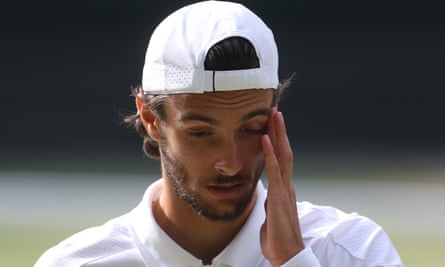When Novak Djokovic revealed that he had undergone knee surgery on 5 June after sustaining a meniscus tear at Roland Garros, most of the players heading to Wimbledon probably breathed a sigh of relief; here, surely, was a chance for them to make a big run without worrying about meeting the seven-time champion. When they saw him turn up for practice with a brace on his right knee, perhaps they thought, good on him, he’s giving it a go but will not be competitive so soon after an operation. They – and everyone else – should have known better.
Just five weeks after his injury, and at the age of 37, Djokovic is into a 10th Wimbledon final and a record 37th grand slam final. His 6-4, 7-6 (2), 6-4 win over a valiant, Lorenzo Musetti of Italy sets up a repeat of last year’s final with Carlos Alcaraz, a chance for revenge, an opportunity to equal Roger Federer with an eighth Wimbledon win and to move clear on his own at the top of the all-time major list male or female – with 25. The numbers are simply staggering.
In his previous match, Djokovic had accused the crowd of disrespect, saying they were booing him under the guise of saying “Ruuune” in support of his opponent, Holger Rune. This time, when he turned his racket around to mimic playing the violin in celebration, the smattering of boos seemed more in jest and in any case, they were more than drowned out by huge cheers.
Taking in his achievement, Djokovic told a story he has repeated many times, about being a young boy in Serbia, watching the Nato bombs fly over his head while dreaming of playing and winning Wimbledon. “It has been an incredible journey,” he said. “I try not to take it for granted, every time I step on this court. Coming to London about eight days before the tournament started, I didn’t know if I was going to be in the tournament or not. I was keeping everything open until the day of the draw. I said before the tournament if I felt like I didn’t have a chance to go deep in the tournament, I probably wouldn’t be playing. I’m obviously very, very satisfied, very pleased and happy to be in another final but I don’t want to stop here. Hopefully I’ll get my hands on the trophy on Sunday.”
The 22-year-old Musetti, in his first slam semi-final, could not have done much more. He made only 22 unforced errors and used his backhand slice beautifully. Sadly, he also never looked like winning, Djokovic smothering his serve with his incredible returns, putting him under pressure in almost every service game. As well as Musetti dealt with it, and he also came up with some wonder-shots, he never managed to get far enough ahead in a set to make a serious dent in the the Serb’s game.

If Djokovic’s movement was a little shaky in the first couple of rounds, he appears to be at full speed now, even though the brace on his right knee remains. While he was aggressive throughout, trying to keep the points short – he went to the net 56 times and won 43 of his forays – he also chased, slid, charged, glided around the court and when Musetti came at him, he either had the answer or bided his time until he could strike back. It was a relentless, brutally efficient performance.
After a tight first set in which Djokovic broke on his way to a 5-2 lead only to be broken back two games later, the Serb clinched the set on his third set chance when Musetti’s drop shot landed short. The Italian, who had pushed Djokovic to five sets when they played at the French Open in June, broke in the opening game of the second set to give himself hope. In the fourth game, he hit the shot of the match with a backhand winner on the run from well outside the tramlines, which prompted applause from Djokovic himself, and gave him a 3-1 lead.
after newsletter promotion
But Djokovic is so used to these situations in matches, these moments when an opponent hits unlikely highs. He waits, he pounces, he hits back. The break back happened in the sixth game and though Musetti saved a set point to force a tie-break, Djokovic raced ahead 3-0 and never looked back, taking it 7-2.
In 285 previous matches over the best-of-five format, Djokovic had lost once when winning the first two sets, to Jürgen Melzer of Austria at the French Open in 2010. It was not going to happen again. He broke in the first game of the third frame and though Musetti saved three match points from 3-5, 0-40 and even had a break point in the following game, a missed forehand cost him dear. Two points later, the match was over.


